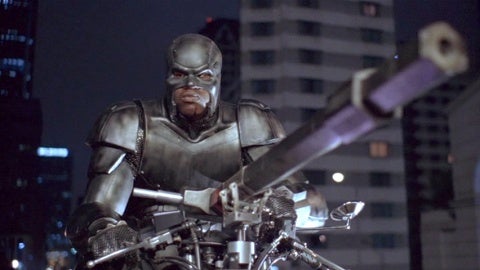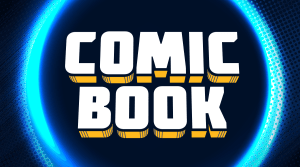With the NBA Finals tipping off tonight, we couldn’t think of a better time to look back at the comic book movie industry’s greatest personal foul, Steel.While not a direct comics-to-NBA tie-in like we covered earlier this week, Warner Bros.’ mid-nineties movie felt more like an NBA plug than a comic book film with it’s frequent references to Shaq/Irons’ lack inability to shoot free-throws, and some concentrated shots ofthe video game NBA Jam in an arcade. Get it? Because it’s Shaq! It’s also a mess.
In just a few years, Marvel Studios is releasing Black Panther, launching their second black superhero franchise after Blade. Steel came out in 1997, the same year as Spawn (also featuring a POC lead character), but both coming out a year before Blade (1997 also gave us Batman & Robin, but that’s a whole other problem itself). I think that says a lot and we’ve come along way from Shaq’s monotone delivery of “it’s hammer time” to the visionary people over at Marvel these days, but three superhero movies with POC leads in a year has yet to be repeated.
Videos by ComicBook.com
Mentioning Steel to comic fans and you’ll probably receive a collective groan in return. The movie takes liberty with the nods and winks to the audience with Shaq’s ties to basketball and Richard Roundtree as Shaft. There’s actually a moment when Irons brings out his hammer and Roundtree’s character Uncle Joe actually says how he “likes the shaft” with Irons and Annabeth Gish’s Susan “Sparky” Sparks both give him an eye-rolling look. They might as well have looked right at the camera, smiled, and winked.
The main critique of the movie is the cartoonish nature of some of the villains as well as the heroes. Judd Nelson’s Nathaniel Burke plays every card in cliche villain deck. From sabotaging a weapon try-out, to killing anybody standing in his way in the most over-the-top ways, Burke does it all and does his very best trying to maintain a badass image. That doesn’t exactly go well. Nelson’s delivery and constant sneer doesn’t do Burke’s character any favors. Even when he’s supposedly the big baddie behind the scenes, he’s constantly coming across as a lackey. I mean given the fact that it’s Steel, sure, he’s on par with Shaq’s goofy expressions and a big enough threat for him.
Steel also takes no time establishing Burke as the villain as well as his motives: make weapons and make sure the biggest street gang has them and that he can profit off of them. Most of Burke’s associates are gang youths, or wannabes, and even a teenage Ray J. who has some of the worst stereotypical “street” dialog imaginable and that’s where the biggest problem lies: every single bit of conversation. It’s weird because you’re watching it and trying to realize if it takes place in the actual DC Universe or not because Shaq’s Man of Steel tattoo is in plain sight, and Uncle Joe tells Irons that he isn’t Superman. There’s a Batcave “joke” too, but it falls flat. Again, wink wink, nudge nudge.
Between Steel and Kazaam, Shaqlearned that this future was not of a leading man status and resorted to taking guest spots and small cameos in television and movies portraying himself. Steel did actually have the first paraplegic in a superhero role as Sparky was based off of Oracle. She even had a weaponized wheelchair and got her own small moment of blowing stuff up. Which is about as cool as you get when your main hero has a hammer that’s also a gun and a magnet.
Steel embraced the more comic side of “comic books”, but it failed to entertain and inspire which certainly had to be disappointing for producer, music legend, Quincy Jones who was a fan of the character. Jones stated that he found that generation’s kids’ “perspective on the future has changed for the worse, and I hate seeing young people who don’t believe in the future. Steel — and I don’t want to use that word ‘superhero,’ because he doesn’t fly or anything like that — represents a role model. Let’s just call him a `super human being.’” Jones also helped release the soundtrack on his Qwest Records label, and it topped out at #26 on Top R&B/Hip-Hop albums with the single “Men of Steel” by Shaq, KRS-One, Ice Cube, B-Real, and Peter Gunz.
Steel serves as part of the learning curve for superhero films as we know now what to avoid. We’ve certainly moved past it and the mistakes creators have made with films like it. With fans clamoring for superheroes with a variety of representation, they might not think the best of Steel, but the want is still very much there, but films like Steel are what we need to steer away from.
But what are your thoughts on Steel, readers? Let us know in the comments below.




